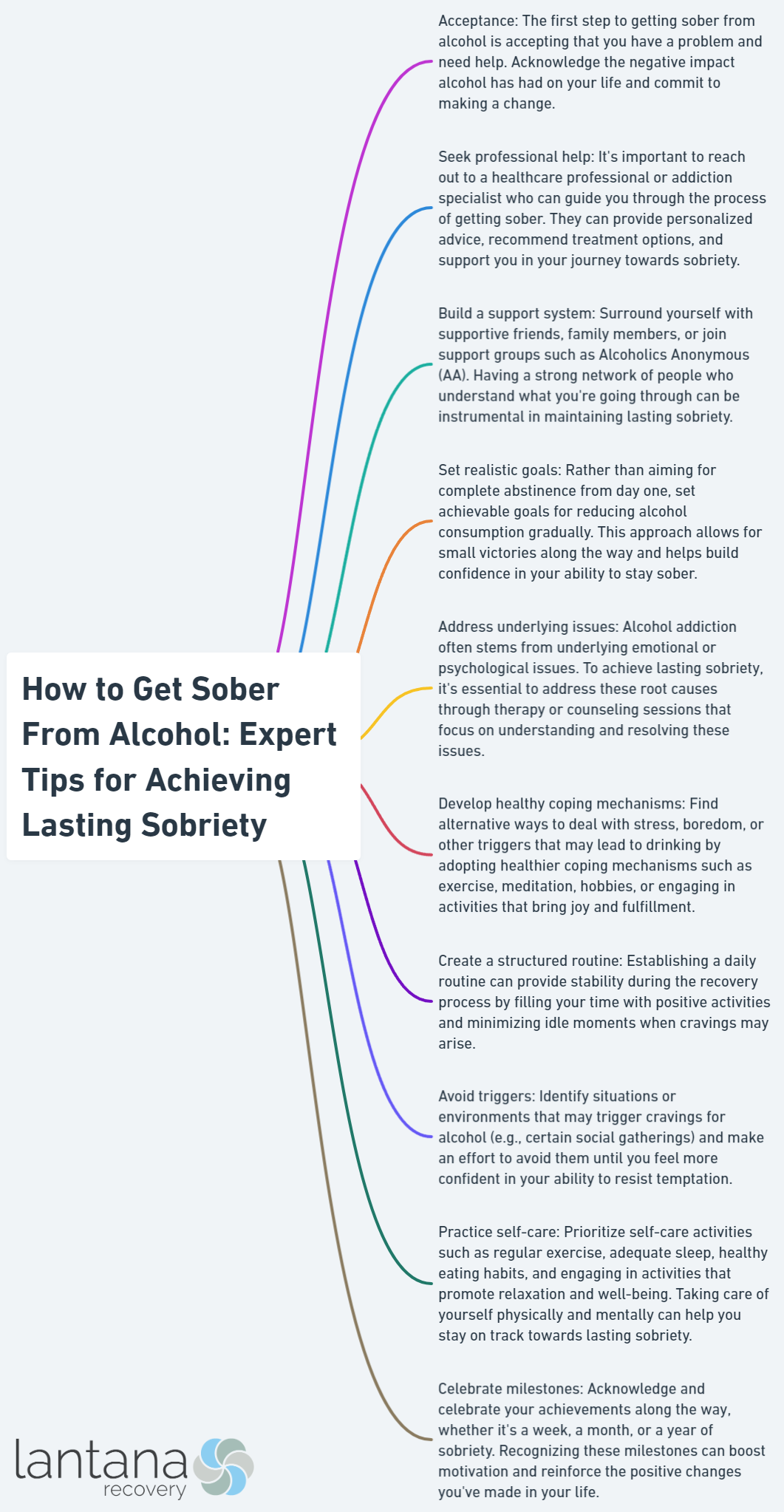Are you ready to break free from the chains of alcohol addiction and embrace a life of lasting sobriety? If so, you’ve come to the right place. In this comprehensive guide on how to get sober from alcohol, we’ll share expert tips for achieving and maintaining a sober lifestyle, from understanding the complexities of alcohol addiction to choosing the right treatment approach. So buckle up and get ready to embark on a life-changing journey that will empower you to reclaim control over your life and experience the countless rewards of lasting sobriety.
Short Summary
-
Gain an understanding of alcohol addiction and develop strategies to overcome physical & emotional reliance.
-
Set SMART goals, build a support network, identify triggers & choose the right treatment approach.
-
Cultivate healthy habits, rebuild relationships, and find balance for lasting sobriety!
Understanding Alcohol Addiction

Alcohol addiction is a complex and challenging condition that affects millions of people worldwide. It is a progressive disease characterized by an uncontrollable urge to consume alcoholic drinks, often leading to devastating consequences in various aspects of a person’s life due to increased alcohol consumption. One of the measurable indicators of this increased consumption is blood alcohol concentration, which can have legal and health implications, such as drunk driving. In some cases, alcohol addiction may coexist with drug abuse, further complicating the situation and contributing to substance abuse issues, including substance use disorder.
Understanding the different facets of alcohol addiction is crucial for anyone seeking to break free from its grip and live a sober, fulfilling life.
Physical Dependence
Physical dependence on alcohol occurs when the body adapts to the presence of the substance and requires it to function normally, leading to withdrawal symptoms when alcohol use is reduced or stopped. Heavy alcohol use can cause noticeable changes in appearance, such as increased facial lines, under-eye puffiness, and blood vessels.
To overcome these physical challenges, individuals must address the root cause of their addiction and develop effective strategies to conquer alcohol cravings, such as seeking anti-craving medication, engaging with a recovery coach, and avoiding certain friendships or activities that may induce drinking urges.

Emotional Reliance
Alcohol addiction doesn’t just impact the body, it also takes a significant toll on an individual’s emotional well-being. Many people struggling with addiction use alcohol as a means of coping with emotional problems or distress, leading to feelings of shame, guilt, and anxiety when the substance is removed.
Addressing the emotional aspects of addiction is crucial for lasting recovery, as unresolved emotional issues can trigger relapse and undermine progress in treatment. By seeking professional help and working through these emotional challenges, individuals can learn healthier coping mechanisms and build a strong foundation for lasting sobriety.
Negative Consequences
The consequences of alcohol addiction extend far beyond the physical and emotional realm, impacting personal relationships, job performance, and overall well-being. Financial troubles, problems finding and keeping employment, and heightened relationship issues are just a few of the negative consequences that can result from alcohol abuse.
Recognizing these consequences and resolving to make positive changes is vital for anyone seeking to overcome alcohol addiction and live a sober, fulfilling life.
Preparing for Sobriety

Deciding to take control of your life and quit drinking is an important first step on the journey to sobriety. However, true recovery involves more than just stopping drinking; it requires a comprehensive and intentional approach to address the underlying issues driving addiction and develop effective strategies for preventing relapse.
In this section, we’ll explore essential steps to prepare for sobriety, from setting realistic goals to creating a strong support network and identifying personal triggers.
Setting Goals
Setting realistic and achievable goals is crucial for staying motivated and focused on your sobriety. By establishing SMART goals (Specific, Measurable, Achievable, Relevant, and Time-bound), you can create a clear roadmap for your recovery journey and track your progress along the way.
Embracing the three P’s of recovery – patience, persistence, and perseverance – will help you stay motivated and overcome obstacles as you strive to achieve lasting sobriety. Remember, the best goals for sobriety involve committing to yourself each day, focusing on your overall health, attending recovery meetings regularly, and staying sober indefinitely.
Creating a Support Network
“Individuals with a substance use disorder (SUD) often possess fewer social support network resources compared to those without SUDs” (How Social Relationships Influence SUD Recovery, Pettersen et al., 2019.) Having a strong support network is a crucial component of successful addiction recovery. Friends, family members, and mutual support groups can offer invaluable encouragement, guidance, and understanding during your journey to sobriety.
Research suggests that mutual support groups can be just as effective as 12-step programs in promoting sobriety, especially for those committed to maintaining a lifetime of abstinence. Don’t be afraid to reach out for help and lean on your support network during challenging times; their support can make all the difference in achieving lasting sobriety.
Identifying Triggers
Recognizing and managing personal triggers for alcohol use is essential for preventing relapse and maintaining sobriety. Common triggers may include social situations, stress, peer pressure, and certain emotions such as hunger, anger, loneliness, and tiredness.
To effectively manage these triggers, it’s important to reflect on past experiences and develop healthy coping skills that can help you resist the urge to drink when faced with challenging situations like at parties or social events. Through self-awareness and proactive planning, you can greatly reduce the risk of relapse and maintain your hard-earned sobriety.
Choosing the Right Treatment Approach

With so many different treatment options available for alcohol addiction, it can be challenging to determine which approach is best suited to your unique needs and circumstances. In this section, we’ll explore various treatment modalities, including formal treatment programs, medication-assisted treatment, and behavioral therapies.
By understanding the benefits and limitations of each approach, you can make an informed decision about which treatment option will offer the greatest chance of success in achieving lasting sobriety.
Formal Treatment Programs
Formal treatment programs, such as inpatient and outpatient rehab facilities like Lantana Recovery, offer comprehensive and structured support for individuals struggling with alcohol addiction. These programs typically combine evidence-based treatments, like medication and behavioral therapies, to address the physical, emotional, and psychological aspects of addiction.
When selecting a treatment program, it’s important to consider factors like cost, reviews, licensing, accreditations, amenities, and available treatments to ensure the best possible fit for your needs. Remember, being ready to change and committed to your recovery is essential for success in any treatment program.
Medication-Assisted Treatment
Medication-assisted treatment (MAT) combines medications with counseling and behavioral therapies to provide a comprehensive approach to treating alcohol addiction. Medications like naltrexone, acamprosate, and disulfiram have been proven to help reduce cravings and promote successful recovery.
By working closely with a healthcare provider, you can determine if medication-assisted treatment is the right choice for you and develop a personalized treatment plan that addresses your specific needs and goals, including consulting with a mental health services administration professional if necessary.
Behavioral Therapies
Behavioral therapies are an essential component of many addiction treatment programs, helping individuals recognize and modify the thought patterns and behaviors that contribute to their addiction. There are several types of behavioral therapies available, including cognitive-behavioral therapy (CBT), dialectical behavior therapy (DBT), rational emotive behavior therapy (REBT), acceptance and commitment therapy (ACT), and applied behavior analysis (ABA).
By exploring different therapy options and working closely with a qualified therapist, you can find the best approach for addressing your specific needs and achieving lasting sobriety.
Navigating Withdrawal and Detox

The process of withdrawing from alcohol and detoxifying your body can be challenging and, in some cases, even dangerous. It’s vital to approach this stage of recovery with caution, seeking medical supervision and support to ensure a safe and comfortable experience.
In this section, we’ll provide information on managing withdrawal symptoms and navigating the detox process, so you can confidently take the first steps toward a sober and healthy life.
Medical Supervision
During detox, medical supervision is paramount for ensuring safety and comfort, as it can help minimize the discomfort and risk associated with withdrawal symptoms. Seeking professional help, such as through a medically supervised detox program, can provide the necessary support and guidance to navigate the withdrawal process safely.
Additionally, medical professionals can prescribe medications like benzodiazepines to manage withdrawal symptoms and reduce the risk of complications.
Coping with Withdrawal Symptoms
Withdrawal symptoms can be both physically and emotionally challenging, making it essential to develop effective strategies for coping with them during detox. Staying hydrated, getting plenty of rest, and seeking medical attention if needed can help alleviate some of the discomfort associated with withdrawal symptoms.
By prioritizing self-care and focusing on your overall well-being, you can increase the likelihood of a successful detox and set the stage for lasting recovery.
Post-Acute Withdrawal Syndrome (PAWS)
Post-Acute Withdrawal Syndrome (PAWS) is a set of impairments that can occur after withdrawal from alcohol and other substances, with symptoms lasting for weeks or even months. Common signs of PAWS include anxiety, depression, insomnia, fatigue, irritability, and difficulty concentrating.
Managing PAWS symptoms effectively can involve medications like acamprosate and psychotherapy, which have been proven to help individuals maintain their sobriety and navigate the challenges of PAWS.
Building a Sober Lifestyle

Creating a sober lifestyle is essential for maintaining lasting recovery and preventing relapse. By developing healthy habits, rebuilding relationships, and finding balance in all aspects of life, you can create a strong foundation for lasting sobriety and enjoy the countless benefits that come with a life free from alcohol addiction. Believe it or not, you can get sober without rehab but recovery looks different for everyone!
In this section, we’ll offer advice on building a sober lifestyle that supports your recovery and promotes overall well-being.
Developing Healthy Habits
Developing healthy habits, such as regular exercise, proper nutrition, and self-care, is crucial for supporting long-term recovery and overall well-being. By making a conscious effort to prioritize your health and adopt healthier habits, you’ll not only improve your physical and mental health but also increase your resilience against relapse.
Remember, every small step you take toward a healthier lifestyle contributes to a stronger, more resilient, and more fulfilling sober life.
Rebuilding Relationships
Addiction can take a significant toll on relationships, leaving a trail of hurt feelings and broken trust in its wake. Rebuilding relationships is essential for a successful recovery, as strong connections with friends and family members provide a vital support network. Family therapy can play a crucial role in this process.
By making amends, practicing humility, and demonstrating consistent sobriety, you can repair damaged relationships and forge new, supportive connections that will help you stay on track in your recovery journey.
Finding Balance
Maintaining balance in all aspects of life is crucial for preventing relapse and supporting long-term recovery. This includes finding equilibrium in work, relationships, personal growth, and self-care.
By regularly checking in with yourself and reflecting on your progress, emotions, and needs, you can stay mindful of your journey and make adjustments as needed to maintain a healthy, balanced, and sober lifestyle.
Summary
Throughout this comprehensive guide, we’ve explored the complexities of alcohol addiction and offered expert advice on achieving lasting sobriety. From understanding the signs and symptoms of addiction to navigating withdrawal and detox, choosing the right treatment approach, and building a sober lifestyle, each step of the journey plays a crucial role in your ongoing recovery. Remember, with determination, focus, and the right support, you can break free from the chains of addiction and embrace a life of lasting sobriety. The journey may be challenging, but the rewards are immeasurable.
Frequently Asked Questions
How do you sober up from alcohol?
If you’ve had too much to drink, the best way to sober up is to take a nap and let your body metabolize the alcohol. Drinking coffee and exercising may help in the short-term, but ultimately the only reliable way to sober up is to get some rest.
What is the hardest part of getting sober?
The hardest part of getting sober is the initial weeks as you may experience uncomfortable withdrawal symptoms and cravings which can tempt you to relapse. Treatment and a supportive environment can help you get through this challenging time.
How long does it take for alcohol to wear off?
It takes about 25 hours for your body to clear all the alcohol, with a half-life of four to five hours. Alcohol detection tests can measure alcohol in the bloodstream for up to 6 hours, on the breath for 12 to 24 hours, and urine for 72 or more hours.
What are the signs and symptoms of alcohol addiction?
Signs and symptoms of alcohol addiction include physical dependence, emotional dependence, increased alcohol consumption, neglecting responsibilities, and drinking in dangerous situations – all of which can have devastating consequences.
Alcohol addiction can have a serious impact on a person’s life, leading to financial, legal, and health problems. It can also lead to strained relationships with family and friends.
If you or someone you know is struggling with alcohol addiction, it’s time to get help.
How can I cope with withdrawal symptoms during detox?
Stay hydrated, get plenty of rest, and don’t hesitate to seek medical help if necessary—these are the best ways to cope with withdrawal symptoms during detox.
Detox can be a difficult process, but taking care of yourself is the best way to ensure a successful outcome. Make sure to drink plenty of fluids, get enough rest, and seek medical help if needed. With the right support, you can make a difference.









